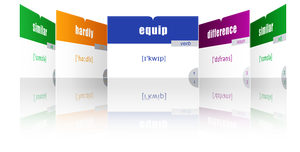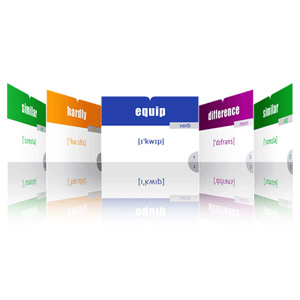TOEFL слова (400 слов) 01-50
- Подробности
- 1470
| 1. | abandon | /əˈbændən/ | отказаться, покидать leave, desert, forsake "She had to abandon her project due to lack of funding." |
| 2. | abduction | /æbˈdʌkʃən/ | похищение kidnapping, seizure, capture "The police responded to the abduction of a young child." |
| 3. | abstract | /ˈæbstrækt/ | абстрактный theoretical, conceptual, intangible "His painting has an abstract quality." |
| 4. | accumulate | /əˈkjuːmjəleɪt/ | накапливать collect, gather, amass "She managed to accumulate a lot of experience over the years." |
| 5. | accuracy | /ˈækjʊrəsi/ | точность precision, correctness, exactness "Accuracy in data entry is very important." |
| 6. | accuse | /əˈkjuːz/ | обвинять blame, charge, indict "He was accused of lying to the board." |
| 7. | acquire | /əˈkwaɪər/ | приобретать obtain, get, receive "He acquired a new skill at work." |
| 8. | acquisition | /ˌækwɪˈzɪʃən/ | приобретение purchase, obtaining, buy "The company’s latest acquisition boosted its revenue." |
| 9. | adapt | /əˈdæpt/ | адаптироваться adjust, modify, accommodate "They adapted to the new environment quickly." |
| 10. | addictive | /əˈdɪktɪv/ | вызывающий зависимость habit-forming, compulsive, obsessive "Many find caffeine to be quite addictive." |
| 11. | adjacent | /əˈʤeɪsənt/ | смежный, прилегающий adjoining, neighboring, next to "The park is adjacent to the library." |
| 12. | adjust | /əˈʤʌst/ | регулировать alter, modify, tune "She adjusted the seat for comfort." |
| 13. | adolescent | /ˌædəˈlɛsənt/ | подросток teenager, youth, young adult "Adolescents go through many changes." |
| 14. | advent | /ˈædˌvɛnt/ | наступление, приход arrival, appearance, onset "The advent of the internet changed everything." |
| 15. | adversely | /ˈædvɜːrsli/ | неблагоприятно negatively, harmfully, detrimentally "His health was adversely affected by the climate." |
| 16. | advocate | /ˈædvəkeɪt/ | сторонник, защитник supporter, promoter, champion "She is a strong advocate for women's rights." |
| 17. | affection | /əˈfɛkʃən/ | привязанность love, fondness, warmth "His affection for his dog was evident." |
| 18. | affluence | /ˈæfluəns/ | богатство wealth, prosperity, abundance "They lived in a neighborhood known for affluence." |
| 19. | aggravate | /ˈæɡrəveɪt/ | усугублять worsen, intensify, exacerbate "The situation was aggravated by the delay." |
| 20. | aggregate | /ˈæɡrɪˌɡeɪt/ | совокупный total, collective, combined "The aggregate score was enough to secure the win." |
| 21. | agnostic | /æɡˈnɒstɪk/ | агностик skeptic, doubter, nonbeliever "An agnostic person is uncertain about religious beliefs." |
| 22. | allegedly | /əˈlɛʤɪdli/ | якобы supposedly, reportedly, apparently "He allegedly committed the crime." |
| 23. | allegiance | /əˈliːʤəns/ | лояльность, преданность loyalty, devotion, fidelity "He pledged allegiance to the flag." |
| 24. | allocate | /ˈæləˌkeɪt/ | выделять assign, distribute, allot "They allocated funds to the new project." |
| 25. | amateurish | /ˈæmətʊərɪʃ/ | любительский unskilled, inexpert, clumsy "His first attempts were amateurish but improved over time." |
| 26. | ambiguous | /æmˈbɪɡjuəs/ | двусмысленный unclear, vague, uncertain "The message was ambiguous and caused confusion." |
| 27. | amend | /əˈmɛnd/ | исправить revise, alter, modify "They amended the contract after negotiations." |
| 28. | analyze | /ˈænəˌlaɪz/ | анализировать examine, study, scrutinize "Researchers analyze data to find trends." |
| 29. | ancestral | /ænˈsɛstrəl/ | наследственный, родовой familial, hereditary, inherited "They visited their ancestral lands." |
| 30. | anesthesia | /ˌænɪsˈθiːʒə/ | анестезия sedation, numbing, unconsciousness "The surgery required anesthesia." |
| 31. | animism | /ˈænɪˌmɪzəm/ | анимизм spirit belief, shamanism, nature worship "Animism attributes souls to natural objects." |
| 32. | annex | /ˈænɛks/ | присоединить add, append, incorporate "The country decided to annex the territory." |
| 33. | anomaly | /əˈnɒməli/ | аномалия irregularity, deviation, aberration "Scientists discovered an anomaly in the data." |
| 34. | anticipate | /ænˈtɪsɪˌpeɪt/ | ожидать, предвосхищать expect, foresee, predict "They anticipated a good outcome." |
| 35. | antipathy | /ænˈtɪpəθi/ | антипатия dislike, aversion, hostility "She felt strong antipathy towards corruption." |
| 36. | apex | /ˈeɪpɛks/ | вершина peak, summit, pinnacle "She reached the apex of her career." |
| 37. | apprehend | /ˌæprɪˈhɛnd/ | задерживать capture, detain, arrest "Police apprehended the suspect." |
| 38. | arbitrary | /ˈɑːrbɪˌtrɛri/ | произвольный random, capricious, unplanned "The decision seemed arbitrary." |
| 39. | arrogantly | /ˈærəɡəntli/ | высокомерно proudly, haughtily, boastfully "He arrogantly dismissed their suggestions." |
| 40. | artillery | /ɑːrˈtɪləri/ | артиллерия weapons, cannons, heavy arms "The artillery was positioned for defense." |
| 41. | ascertain | /ˌæsərˈteɪn/ | удостовериться verify, confirm, determine "They tried to ascertain the truth." |
| 42. | assail | /əˈseɪl/ | нападать attack, assault, strike "He was assailed by doubts." |
| 43. | assess | /əˈsɛs/ | оценивать evaluate, appraise, judge "Experts assess the building’s condition." |
| 44. | asset | /ˈæˌsɛt/ | актив resource, benefit, possession "His skills are a valuable asset to the team." |
| 45. | assimilate | /əˈsɪməˌleɪt/ | ассимилировать integrate, absorb, incorporate "Newcomers often need time to assimilate." |
| 46. | associate | /əˈsoʊʃiət/ (noun) /əˈsoʊʃiˌeɪt/ (verb) | ассоциировать connect, relate, link "Many associate the color blue with calmness." |
| 47. | astrological | /ˌæstrəˈlɒʤɪkəl/ | астрологический zodiacal, horoscopic, celestial "She was interested in astrological predictions." |
| 48. | atheist | /ˈeɪθiɪst/ | атеист nonbeliever, skeptic, agnostic "As an atheist, he didn’t believe in deities." |
| 49. | augment | /ɔːɡˈmɛnt/ | увеличивать increase, enhance, expand "They aimed to augment their income." |
| 50. | authority | /əˈθɔːrɪti/ | власть power, control, influence "He questioned the authority of the leadership." |











 Как правильно изучать английский язык по карточкам (статьи)
Как правильно изучать английский язык по карточкам (статьи)